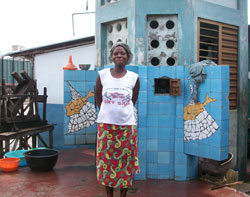Benin
Urban Hygiene Improvement
The poor urban neighborhoods of Benin’s major city Cotonou suffer from flooding, lack of services, and widespread open defecation. WASHplus is implementing the Urban Hygiene Improvement Program, a three-year hygiene behavior change activity focused on hand washing and household water treatment funded by USAID/Benin as part of its Global Health Initiative, in the most underserved neighborhoods of Cotonou. Local NGO ABMS/PSI is WASHplus’s on-the-ground implementer of its social marketing and hygiene promotion activities, which will use local media, household visits, and school and health center- based programs to raise awareness and foster improved practices. The marketing activities will also focus on the supply of Aquatabs for water treatment. 
To better understand the current household WASH conditions and what barriers prevent and facilitators promote the adoption of improved hygiene practices in these slum households, WASHplus carried out a baseline survey, the results of which have recently been released and will inform the Ministry of Health’s new urban hygiene and sanitation strategy. WASHplus has combined forces with UNICEF to raise awareness of the conditions in these peri-urban zones and foster increased investment by the government of Benin and donors to improve WASH services and practices.
WASHplus has also partnered with Peace Corps/Benin to produce and test a set of technical materials that volunteers will use to carry out small-scale community and school WASH projects.
RESOURCES
Stories
 |
WASHplus opened the eyes of a peri-urban school’s PTA about the poor state of the school’s latrines. When government help was too slow to solve the urgent problem, the PTA came through with funds and action. Read more. |
 |
Amélioration de la qualité de l’eau de boisson dans les écoles: les élèves prennent l’initiative. The Benin peri-urban program has taken a new turn by including schools in its efforts to foster improved hygiene practices. Lack of latrines, drinking water and hygiene is acutely felt by the schools. The 10 schools in the pilot neighborhoods of Enagnon and Agbato showed great enthusiasm and engagement after intensive sessions with ABMS school activities coordinator Victoire Mongbo. | English summary | French version | |
 |
What is the USAID/WASHplus Benin Urban Hygiene Improvement Program? USAID’s WASHplus project is carrying out a pilot hygiene improvement program in two of Cotonou’s most neglected peri-urban neighborhoods, Agbato and Enagnon. The program focuses primarily on handwashing with soap and safe household drinking water. Poor access to sanitation is being addressed through a trial of community-led total sanitation adapted to peri-urban conditions. | English version | French version | |
Publications
Baseline Survey of Peri-Urban Sanitation and Hygiene in Cotonou, Abomey-Calavi, and Porto-Novo, Benin, 2015. Almost no WASH data exist for the unplanned peri-urban areas and the poorest& neighborhoods of Cotonou, Abomey-Calavi, and Porto-Novo. Given the health impact on households without access to water, sanitation, and hygiene, it is critical to obtain a better understanding of the magnitude of the problem in these areas. This information will help develop a strategy to improve water supply and sanitation as well as hygiene practices, which will lead to the improvement of the health status of poor households in urban areas. It is in this context that this household survey was implemented in three peri-urban areas of the cities of Cotonou, Abomey-Calavi, and Porto-Novo to generate the information needed to design such a strategy
Peace Corps Benin WASH Tools and Training Resources, 2014. French language training materials on household water treatment, community-led total sanitation and WASH in schools.
Benin Stats in Brief
Population - 2012 (x1000)
- 10,051
Water Access (improved source)
- 69% rural areas
- 85% urban areas
- 76% national total
Sanitation Access (improved facility)
- 5% rural areas
- 25% urban areas
- 14% national total
Source: UNICEF/WHO JMP 2014

